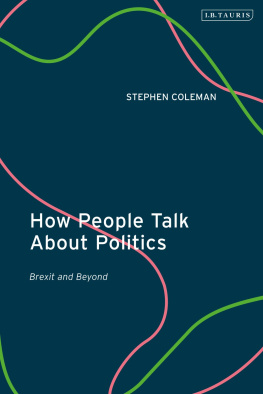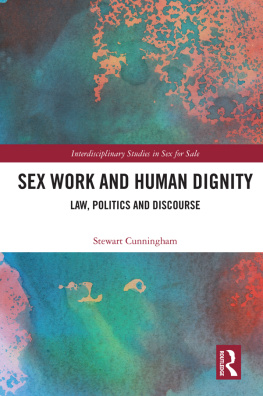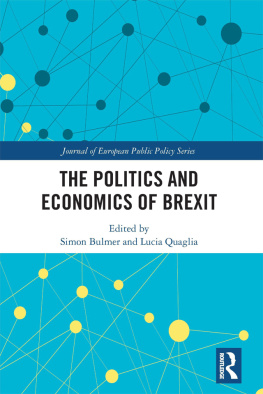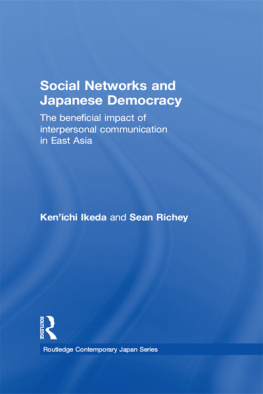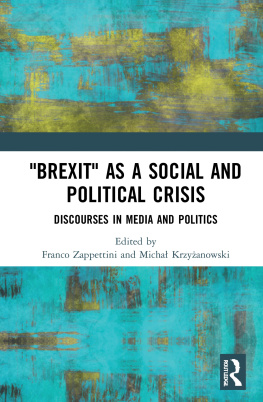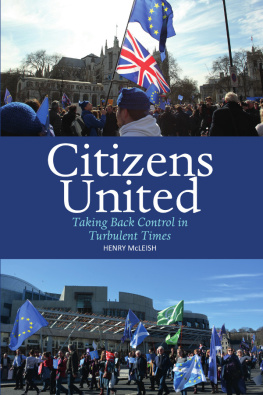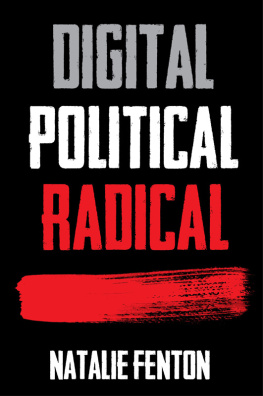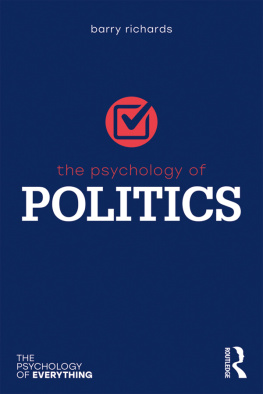How People Talk About Politics
How People Talk About Politics
Brexit and Beyond
Stephen Coleman
Contents
When I think back to moments in which I have been engaged in political talk, my mind is flooded by emotions, reminding me that to speak is to declare oneself present in the world. I recall occasions in which I have struggled to find the right words for intensely felt thoughts, and others in which I have become conscious of my values only as I have begun to articulate them. And others still when I have been so engrossed that I was unable to distinguish between speaking and listening. In all of these moments I was acutely aware that to talk about how the world is and should be is an exhilarating challenge a reminder of both agency and vulnerability.
Speak, you also/speak as the last/have your say , writes Paul Celan in one of the finest of his poems. This is a book about what it feels like to take up Celans invitation. It is a book about why people speak as they do; why some hardly speak about politics at all; and why most of us speak more politically than we might realize or admit. It is a book about how we learn to talk politics as a social practice, replete with tacit customs and rules. It is not a book about technologies of political talk. Questions about whether newspapers, television or social media are good for democracy have been asked by countless scholars, nearly all of whom have concluded that it depends on what sort of newspapers, television or social media we have. Before political talk can be printed, broadcast or circulated, it must be enunciated. How well this happens depends upon that most sophisticated of technologies: the voice. This is a book, therefore, about voices in their most common context of interaction: face-to-face talk.
I could not have written this book unless people had consented to speak with me about their memories and experiences of political talk. In fact, they more than consented. I soon discovered that for many of my interviewees, telling stories about their experiences of political talk allowed them to access biographical streams that took them to the core of their identities. It follows from this that the present book is not only about what it means to talk about politics but also about how it feels to adopt ones own position in the world. Doing so entails mustering the courage and confidence to take a stand, and how that can be encouraged is the theme of the books concluding chapter.
It will be clear from each of the following chapters that I could not have written this book without learning from many thinkers whose names are liberally referenced. I have read some of them with such appreciation and/or misgiving that I feel as if I have been in protracted conversations with people I have never met. I hope they will forgive me for my excitability during these imaginary exchanges. I have been very lucky to have had more direct conversations over the years with friends, colleagues and students who have encouraged me to work through some of the ideas presented in this book. They include Jay Blumler, John Corner, Roderick Hart and, more recently, Tom Wright and the excellent team of researchers working on the AHRC-funded Speaking Citizens project.
I am grateful to the British Academy for funding the research which led to this book being written. The assistance I received at various times throughout the writing process from David Wright, Malaika Cunningham, Andy Irving, Katie Peate and Angeline Dresser is much appreciated. I wish to thank Tomasz Hoskins and Nayiri Kendir at Bloomsbury Press for their confidence in this project and Mohammed Raffi for his diligent attention to the text. My PhD students have always inspired me to think harder, so I thank them. And without the stimulating intellectual environment of the School of Media and Communication at the University of Leeds, I would have felt less motivated to write.
Over the past ten years I have taught undergraduate courses designed to develop students confidence in speaking. I want to thank all the students who have taken those courses for demonstrating what is involved in speaking courageously.
As I write this Preface, society is going through an exceptional period a grand lockdown in which we have all had to become acutely aware of the limits of our personal agency. We are having to learn to act in new ways, distanced physically and yet thrown socially into a common conversation. There has been much speculation about what life will be like after this. Allow me to express one hope: that when this is all over we might learn to become a more confident democracy, saying what we mean to say, excluding no voices from our public discourse. That, anyway, is the normative thrust of what follows.
I dedicate this book to Bernadette, Safi, Kari, Simon and Olivia.
In 2016, the British people engaged in a grand act of national catharsis: a referendum that was about their status; their borders; their fantasies of self; their grievances of decline; their interests; their emotions; their long-standing mutterings of and another thing that really annoys me; their right to piss off the government; their historic destiny; and, tangentially, whether to remain members of the European Union.
People were told that there was to be a national conversation in which they would have their say. In preparation for this critical deliberation, newspaper editorials offered instructions on how to behave: In the coming months, we are going to have to endure a great deal of disagreement and must try to do so politely and with good humour, recognising that it is a sign of democracy in motion ( Daily Telegraph , 6 March 2016). The endurance of disagreement was presented as an imagined risk. Would it lead to fights in the street, bricks through neighbours windows or angry divorces? The prime minister David Cameron appealed to the democratic maturity of the British people: We should all be big enough to have an honest and open, but polite disagreement, and then come back together again afterwards. Here again, the emphasis was upon resilience to endure the stress of dissensus. Political articulation was conceived as a temporary interruption of social accord, but its disruptive candour could only be sustained long enough to prepare the ground for renewed consensus: coming back together again afterwards.
The days and months leading up to the referendum entailed the playing out of a stock metaphor of the people having their say. Emerging languidly from the murky inattention that had prevailed in the days before plebiscitary responsibility was thrust upon them, non-politicians were invited to give voice to their interests and longings as if they could make a difference. This was democracy in its most potent symbolic register, bringing into being a demos capable of asserting, deliberating, demanding and resolving, while at the same time standing as a conspicuous addressee and vulnerable object of persuasion. Assured in their belief that this time they could not be ignored, people found themselves talking with an energy that many had forgotten they possessed. It was as if words might change everything.
What transpired turned out to be less like a national conversation than a fractious cultural convulsion. People began to fall out. There were whispered suspicions and shaming accusations, each side disappointed by the insensibility of the other. Strangers worked hard to ignore one another and then felt stranger than ever. Even loving partners and close families found themselves drawn into the enveloping animus:
So my partner said he felt like I was being racist. But Im not being racist because Im not a racist person. But because Id said I do think its time we did say no to everyone coming in and there are people that are working, but there are people that are scrounging, and to me it is time as a country that we said no... he just thinks that Im being racist.... So we had arguments about that. It was pretty heated.... And yeah, it does insult me because Im not racist. I dont see myself as a racist in that I dont value everyone the same, because I do.... So yeah, it does insult me. I dont think its fair. (Abbey, 26-year-old shop worker)

